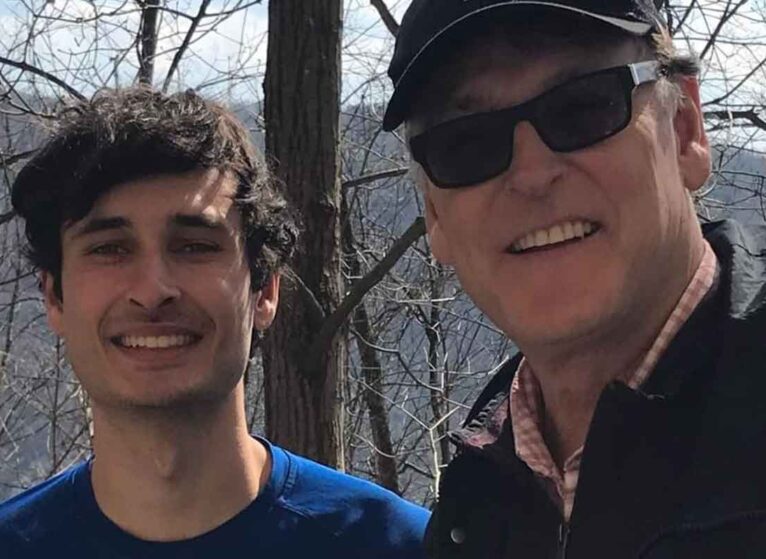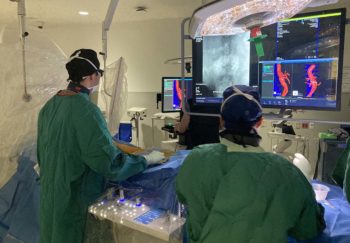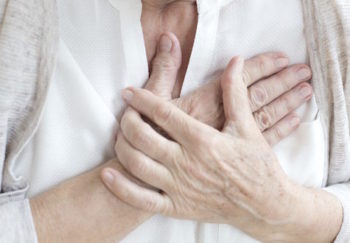Mark Cave was making repairs on his rental property when he felt a “bolt of lightning” in his chest. He sat down and texted his wife to say, “I love you and I think I’m having a heart attack.”
It’s not surprising that Cave thought he was having a heart attack. He had several common symptoms, like severe chest pain. But it was actually a different emergency — a tear in his aorta (called an aortic dissection).
Heart attacks and aortic dissections are both life-threatening emergencies that need fast treatment. They’re easily mistaken for each other because they have similar symptoms. Telling them apart is critical to getting the right life-saving treatment.
Read how paramedics picked up on Cave’s arterial dissection symptoms. Plus, learn whether you're at risk and what to do about it.
Heart Attack vs Aortic Dissection
Aortic dissection and heart attack can look the same, but they’re very different.
A heart attack is from a blocked artery going to the heart. An aortic dissection is a tear in the inner wall of the body’s main artery — the aorta.
The aorta sends blood away from our heart to the rest of our body. It’s the size of a garden hose and shaped like a candy cane. A dissection can block blood from getting to vital organs or cause the aorta to burst open (rupture).
What You Need to Know About a Major Killer
Like a heart attack, aortic dissection can be deadly. It kills more than 10,000 people each year. The death rate for people who have an aortic dissection has been rising over the past decade.
This is especially true for women and Black adults, shows research published in the Journal of the American Heart Association.
Aortic Dissection Symptoms Can Mimic a Heart Attack
An aortic dissection and heart attack are both medical emergencies. Like Cave, you’ll want to call 911 right away if you have any of these aortic dissection symptoms:
- Sudden severe chest or upper back pain
- Pain that feels like tearing or ripping and spreads to your neck or down your back
- Sudden severe stomach pain
- Loss of consciousness
- Shortness of breath
Aortic Dissection Symptoms Can Also Look Like a Stroke
Aortic dissection symptoms can even sometimes be more like a stroke. A stroke happens when a torn or blocked artery keeps blood and oxygen from getting to the brain.
These aortic dissection symptoms are similar to signs of a stroke:
- Sudden vision problems
- Difficulty speaking
- Weakness or loss of movement on one side of your body
- Weak pulse in one arm or thigh compared with the other
- Leg pain
- Difficulty walking
Again, if you see any of these symptoms, call 911 right away.
Aortic Dissection Blood Pressure Difference
Cave is grateful to the Charlottesville paramedic team for picking up on a critical clue. The blood pressure reading in his left arm was a lot different from the reading in his right arm.
This likely meant his symptoms were from a torn aorta rather than a blocked heart artery. Paramedics alerted doctors at UVA Health so Cave could get the right treatment.
Finding out if you're at risk for aortic dissection could save your life. First, if you know, you can take steps to prevent it. But if you do have symptoms, you can alert first responders to your risk.
Who’s At Risk for Aortic Dissection?
Lots of people are at risk. And there’s good news: heart doctors can monitor your aorta to keep you from having an aortic dissection.
High Blood Pressure
Not controlling high blood pressure over the long run or stopping blood pressure medications can trigger an aortic dissection.
Extreme Strain
Another trigger is an injury to the chest like extreme straining from body building.
Genetic Conditions
These genetic syndromes greatly increase your risk for thoracic aortic disease and a potentially fatal aortic dissection:
- Marfan syndrome
- Loeys-Dietz syndrome
- Turner syndrome
- Vascular Ehlers-Danlos syndrome
You Have Aortic Disease
Two aortic conditions can put you at greater risk for aortic dissection:
- Bicuspid aortic valve disease (2 instead of 3 flaps)
- Thoracic aortic aneurysm (weak spot in aorta wall)
Aortic Disease Runs in Your Family
You’re also at greater risk if you have any immediate relatives with:
How to Prevent Aortic Dissection
If you have risk factors, you’ll want to see a heart doctor who specializes in aortic disease. They can do aortic imaging to measure the size of your aorta. This way, they can find aortic disease even if you don’t have symptoms.
The actor John Ritter died of an aortic dissection. After Ritter’s death, his family members had imaging to find out if they had an undetected aneurysm. John’s brother did and had it surgically repaired to prevent a tear.
It’s also really important to control high blood pressure with medication.
And because aortic disease can run in families, you’ll want to consider genetic counseling.
Worried About Aortic Dissection?
You need the experts at UVA Health's top Aortic Center.
Emergency Aortic Dissection Surgery Saves Mark’s Life
Cave heard sirens as soon as he hung up after calling 911 when he had aortic dissection symptoms. A fire station was only a block and a half away. Paramedics arrived within a minute. And only a mile away was the team of heart and vascular surgery experts at UVA Health.
Cardiovascular surgeon John Kern, MD, led a team that repaired Cave’s aorta during an emergency 12-hour surgery. Cave’s aortic dissection was so severe it would have been fatal if not caught within the first few minutes.
Cave needed major surgery to repair his aortic dissection. But some people who have an aortic dissection don’t need surgery. Treatment depends on how severe it is and where the tear happens. Experts can manage some aortic dissections with medication or minimally invasive endovascular techniques.
Cave is long fully recovered after going through cardiac rehabilitation. And almost a decade later, he remains grateful to UVA Health — not just for saving his life, but his son’s life.
Another Medical Emergency in the Cave Family
In 2014, Cave brought his 13-year-old son, Sebastian, to the pediatric emergency department at UVA Health. It was two years before Cave was hit with severe chest pain and other aortic dissection symptoms.
A brain imaging scan revealed Sebastian had a benign brain tumor. But UVA Health neurosurgeons removed the tumor and fluid buildup that was threatening the boy’s life. And Sebastian is now a Wake Forest University graduate. His dad is a proud Wake Forest alum, too.
“The overarching moral of this story has to do with the brilliance of the local paramedics and the doctors and nurses at UVA Health,” Mark Cave says. He adds, “Had it not been for their incredible training and dedication to their craft, I wouldn’t be here and my son wouldn’t be here today.”


